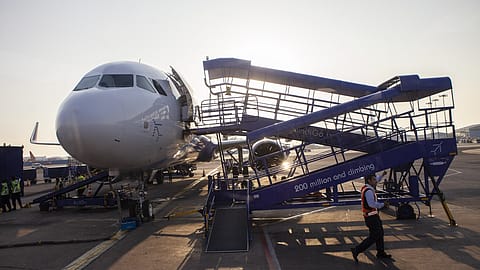DGCA starts special audit amid repeated tech snags in airlines
DGCA says airlines resorting to frequent “one-off authorisation to category A certifying” staff at transit stations, which is not in line with existing regulatory provisions

The aviation regulator directorate general of civil aviation (DGCA) has started a two-month special audit of airlines after it conducted spot checks recently to probe continuous technical malfunctions and other issues with domestic airlines.
The regulator had conducted spot checks amid the increasing number of such incidents, and it found that planes were being certified by "inadequate and unqualified" engineers.
The market regulator has also launched multiple separate probes against these airlines over the recent incidents. As part of the extensive audit, the DGCA will examine key facilities including hangers and stores, equipment used by airline employees, quality assurance systems, grounded aircraft and maintenance control centres. It will also check if airlines have deployed an adequate and qualified workforce to carry out operations or not.
Their duty-time restrictions, maintenance data, turnaround time during transit and various MEL (minimum equipment list) releases will also be thoroughly examined.
Amid a spate of mid-air incidents involving domestic airlines, the aviation regulator had issued a series of instructions to be followed by airlines and had asked to ensure compliance by July 28, 2022. The DGCA found airlines did "improper identification of the cause of a reported defect". It also found an increasing trend of MEL releases and non-availability of required certifying staff to cater to “multiple scheduled arrivals or departures” in a short interval.
According to the DGCA, airlines were also found to be resorting to frequent “one-off authorisation to category A certifying” staff at transit stations, which is not in line with existing regulatory provisions. "Keeping the above in view, it has been decided that all aircraft at base and transit stations shall be released by certifying staff holding AME category B1/B2 licence, with appropriate authorisation by their organisation," says the DGCA.
Airlines have also been advised to position certifying staff at all base and transit stations with the required tools and equipment. "Alternatively, you may opt for sending the certifying staff on flight duties," says DGCA.
Recommended Stories
Airlines continue to come under the DGCA scanner for frequent incidents, which have pointed towards issues with safety and maintenance.
Here are some incidents related to malfunctions in airlines, which were reported recently.
July 21: Air India's Dubai-Kochi flight diverted to Mumbai after cabin pressure loss.
July 21: Go First's two flights -- Mumbai-Leh and Srinagar-Delhi -- reported snags in their engines.
(INR CR)
June 20: Delhi-Guwahati Go First flight diverted to Jaipur as the aircraft's windshield cracks mid-air.
July 17: Sharjah-Hyderabad flight of IndiGo diverted to Karachi, Pakistan after pilots observe defects in the engine.
July 16: Air India Express' Calicut-Dubai flight diverted to Muscat as the crew observes a burning smell in the cabin.
July 15: In Air India Express Bahrain-Kochi flight, pilots observed a live bird in the cockpit.
July 12: SpiceJet's flight SG23 was delayed due to a "last-minute technical issue". It says an alternative flight was arranged for passengers and that the aircraft suffered tech issues.
July 5: A SpiceJet Boeing 737 aircraft carrying passengers from Delhi to Dubai had to be landed in Karachi, Pakistan, after developing a technical malfunction.
July 2: SpiceJet's Delhi-Jabalpur flight had to be returned as crew members observed smoke in the cabin mid-air due to oil leakage in one of its engines.
June 20: A SpiceJet Boeing 737-800, with about 200 people on board, had to be returned to Patna after take-off as sparks were observed in one of its engines.